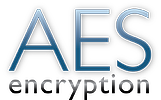What is NIST?
 The National Institute of Standards and Technology (NIST) is a US government agency that is a part of the Department of Commerce. The NIST sets non-military government standards for a wide variety of techn ologies including data encryption. Because the NIST uses an open and professional process to establish standards, the private sector usually adopts NIST standards for commercial use. The NIST is one of the most trusted sources for technology standards.
The National Institute of Standards and Technology (NIST) is a US government agency that is a part of the Department of Commerce. The NIST sets non-military government standards for a wide variety of techn ologies including data encryption. Because the NIST uses an open and professional process to establish standards, the private sector usually adopts NIST standards for commercial use. The NIST is one of the most trusted sources for technology standards.
What is AES?
 The Advanced Encryption Standard (AES) is the standard for data encryption adopted by the NIST in 2001. This encryption standard replaced the earlier Data Encryption Standard (DES). The DES encryption standard became weaker due to the advancing power of computer systems. The NIST began a process in the late 1990’s to find a replacement for DES. After a lengthy examination of several alternatives, the AES standard for encryption was adopted and codified as FIPS-197. AES encryption is now the de-facto standard for strong data encryption.
The Advanced Encryption Standard (AES) is the standard for data encryption adopted by the NIST in 2001. This encryption standard replaced the earlier Data Encryption Standard (DES). The DES encryption standard became weaker due to the advancing power of computer systems. The NIST began a process in the late 1990’s to find a replacement for DES. After a lengthy examination of several alternatives, the AES standard for encryption was adopted and codified as FIPS-197. AES encryption is now the de-facto standard for strong data encryption.
What is AES Validation Testing?
NIST sets the standard for AES encryption testing, and charters independent labs to administer and oversee the testing process. Through the National Voluntary Laboratory Accreditation Program (NVLAP) the NIST certifies independent testing labs for the Cryptographic Module Validation Program (CMVP). Data security software vendors administer the tests, validate the results, and submit the results to the NIST for acceptance. Software vendors work with an independent certification laboratory and not with the NIST directly.
The NIST established five methods, or modes, of encryption that can be used with AES. These are Electronic Code Book (ECB), Cipher Block Chaining (CBC), Counter (CTR), Output Feed Back (OFB), and Cipher Feed Back (CFB) modes. There are separate tests for each mode. A software vendor can choose to validate on only one mode, a subset of the five modes, or all modes of encryption. In addition, the NIST defines three key sizes for encryption: 128-bit, 192-bit, and 256-bit keys. A software vendor can choose from one to three key sizes to certify.
Most software vendors choose to certify just one or two modes of encryption, and on one key size. The Alliance AES Encryption products are certified on ALL five modes of encryption, and all three key sizes.
Certification Means Strong Encryption
NIST certification is your assurance that a vendor’s AES encryption solution implements data encryption the right way. There are many ways to use encryption and a wide variety of modes of encryption. Improperly implemented solutions may work for one type of task, but fail under different application requirements. All software vendors claim they implement strong encryption. Can they prove it? Ask them for their NIST certification.
Certification Means Compatibility
One of the biggest challenges facing Enterprise customers is encrypting and decrypting data on a variety of platforms. Data may be encrypted in an Oracle database, then transferred to Microsoft SQL Server, then to an IBM i (AS/400) platform. Computer vendors use different methods of encryption, and different modes of encryption. How can you be sure that your encryption solution will be able to handle all of your requirements?
The NIST certification provides the assurance you need that your software is up to the task. Certified software must work the same way for all of the NIST defined encryption tasks.
The Alliance AES solutions provide even more assurance of compatibility – Alliance AES solutions are certified on all key sizes and all modes of encryption. No other data security vendor provides this level of certified support.
Alliance AES Encryption on Every Enterprise Platform
 The modern Enterprise uses a wide variety of server platforms from a number of different vendors. In addition, data is exchanged with customers, vendors, and service provides outside the organization. To meet these challenges the Alliance AES Encryption products are certified and available on all Enterprise platforms including:
The modern Enterprise uses a wide variety of server platforms from a number of different vendors. In addition, data is exchanged with customers, vendors, and service provides outside the organization. To meet these challenges the Alliance AES Encryption products are certified and available on all Enterprise platforms including:
• Microsoft Windows (2000/XP/2003)
• Linux (SUSE and Red Hat, on Intel and POWER)
• UNIX (AIX, Solaris)
• IBM i (AS/400, iSeries)
• IBM z (mainframe)
All of the certified Alliance AES encryption solutions work the same way on every platform.
Townsend Security is currently offering a free 30-day evaluation of the Alliance AES encryption solution for your platform.

